CHICAGO — Partnering with leading food ingredient companies, Univar, Inc. is poised to become an industry force, said Austin Nichols, director, food ingredients, Univar. Creating a fully integrated digital experience will be key toward reaching this objective, he said.
Mr. Nichols spoke with Food Business News July 17 during IFT18, the Institute of Food Technologists’ annual meeting and exposition, at McCormick Place in Chicago and four months after Univar entered an agreement with Cargill to become a distributor for Cargill cocoa, chocolate, starches, sweeteners, texturizers and oils.
Based in Downers Grove, Ill., Univar distributes commodity and specialty chemicals, ingredients and related services worldwide. Established in 1924, the company's sales in 2017 totaled $8.3 billion. Globally, Univar has 8,000 employees. The United States accounted for about 56% of sales last year.
The Cargill agreement followed a year of reorganization at Univar. While the company has had a significant presence in food and beverages for many years, this activity was overshadowed by Univar’s business with other industries.
The reorganization at the beginning of 2017 placed a heightened emphasis on food and beverages. Mr. Nichols said Univar’s book of food business had been larger than widely appreciated for a long time. He said the company’s presence in the industry in the past was sometimes considered accidental, overlapping the use within the food business of chemicals and other products widely used by the industries that were core Univar customers.
“We’re the largest chemical distributor in North America,” he said. “In the past, a Univar salesperson would call on a paint company in the morning and Nestle in the afternoon. No more.”
Univar for many years had focused on the textile and electronics business, but as those sectors moved manufacturing to other locations globally, Univar has shifted its focus to industries it describes as “population based,” such as food, pharmaceuticals, personal care and coatings.
The Cargill agreement added to Univar’s already significant portfolio of ingredients and partnerships. Even before the Cargill agreements Univar offered a range of ingredients, including emulsifiers, taste solutions, sweeteners and phosphate. Existing partners included Ingredion, Inc. and Kerry.
 “We operate 65 warehouses in the United States, which means essentially we can reach anywhere within 1½ days,” Mr. Nichols said. The company also operates more than 3,500 trucks and 1,000 railcars.
“We operate 65 warehouses in the United States, which means essentially we can reach anywhere within 1½ days,” Mr. Nichols said. The company also operates more than 3,500 trucks and 1,000 railcars.
Mr. Nichols said Univar seeks to compete with regional distributors by bringing a “global scale with a regional touch.” A decentralized sales structure is key to this approach.
Mr. Nichols said the rapid growth of e-commerce in recent years makes the idea of “two-click reordering” easier to envisage.
“Once a customer has been fully vetted for food security, quick reorders are achievable,” Mr. Nichols said. “(The distribution world) may not go fully digital tomorrow, but whoever is there first will win.”
To his confidence Univar will digitize distribution, Mr. Nichols brings experience. Prior to joining the food and beverage group, he spent nearly seven years at ChemPoint, a Univar subsidiary based in Bellevue, Wash. Established in 1999 and operating independently within Univar, ChemPoint is a digital market focused group with few physical assets, he said. While the businesses operate independently, learnings from ChemPoint have been shared with other Univar divisions, Mr. Nichols said.
He said Univar is still considered by many a newcomer and is seeking to “educate customers about who we are.” He said the company is promoting its strength around product innovation, its distribution resources and its broad portfolio of ingredients.
He said the distribution agreement with Cargill likely is not the last time the company will make news.
“We are a net consolidator,” he said. “We will be active with suppliers next year.”




